
In Tibia's earliest days, during Alpha 1-3 the game had an incredibly small community. A few players mainly cause problems for others, but they were easily handled by CIP. However, as the game began to grow so did the community, bringing more conflicts which required precious time that CIP could not spare. With the update to Beta 4, the Wizard program was launched to help police the game. Designed so that the community could directly excise troublemakers without having to involve CIP, this very small group of players would comprise of the games most well respected and well-known players.
The role of the "Wizard", named after the role, found in old text-mud games, did not carry the same power as it's namesake. Originally the Wizard role was more like a game ambassador, and no rules existed so Wizards had to decide what should be part of the game and what should result in an exclusion from playing. To help with this role they were given a teleport spell which could take them to the temple or to another player and a ban spell to banish characters for a week.

There were no invincible characters during this time and even a God could be killed if a player were quick enough. Death was a serious threat in Tibia and each Wizard would respond to an issue on their main character, risking the work they put in. Villainous characters hated how these chosen players wielded their power against them, often complaining of abuse of power and attacking their characters in revenge. Being a Wizard may seem like a glamorous role, but most would tell you it was a thankless role which consumed huge amounts of time.
To help navigate the nebulousness of a rule-less game, a forum was set up for Wizards on Yorin's board for them and CIP to the discuss bans and courses of action. Steve took particular interest in interacting with the Wizards in their decisions on what to ban. There was no formal system of appeal, so most decisions were final. As there was no real last consequence for bans, it wasn't a big deal.
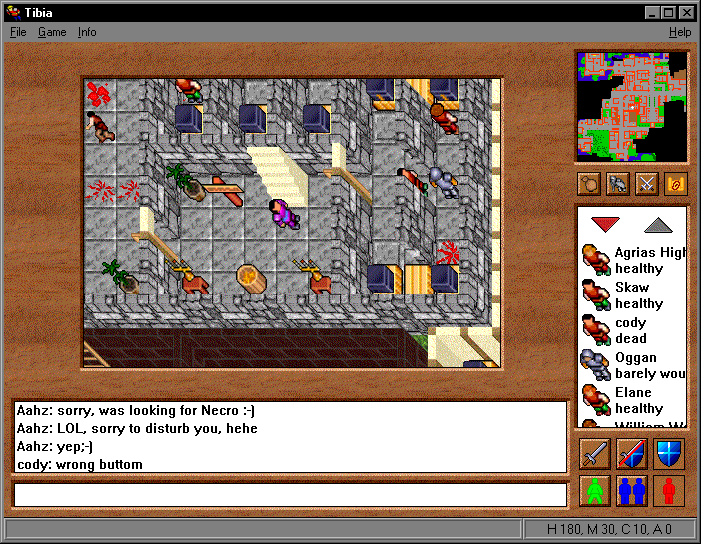
As first the main function of the role was to find and punish cheaters and exploiters of game weaknesses which was more prevalent at the time. One such example was the new Zombie bug which allowed players to become invincible after losing all their HP, which they would then become unkillable and be able to attack without fear. This bug was so easy to exploit that it was very common to see it exploited and fixing the mechanics which caused it would be a slow process. Cheating of all kinds was a serious problem in the game and exploitation of bugs to gain rapid skills was also a community favorite. Players, in one example, would push spiders down an easily accessible hole, there by stacking them. This allowed them to drop into the hole and gain rapid shielding as each hit counted towards a shield advance and it was not required that you attack back. Attacking without getting hit back and not doing any damage would also result in the same. Massively powergamed skills turned even low-level PKs into very deadly melee fighters. Another cheat according to Knightmare was a bug where a player could shoot a bow at a creature while on top of it and crash the server, there by creating an easy way to duplicate items. An in-game Wizard could banish these trouble makers much faster than CIP could respond, though finding cheaters was still a difficult task.
Despite the difficultly of the job, the program continued to expand to also include punishing people for horrific names, extreme statements like rightwing comments, and harassment in the form of spamming as no ignore features exists. This large increase to their duties continued to take a toll on Wizards as the game continued to grow, consuming more of their own time to manage the system, and spending more time arguing over what each Wizard and CIP thought was exclusion worthy.
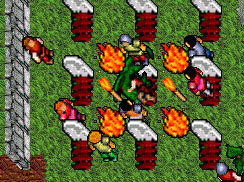
The program ended abruptly near the end of Beta 4 after an incident with Alatar. I have read all kind of rumors as to what happened from that he used a Zombie Bug to resolve a situation to other strange scenarios. The most reliable information I have is that he banished every player who logged into the game as a protest to the massive cheating that was going on in Tibia. Gm Faerin recalls that he logged in and kept seeing name after name show up in the status bar as being banned. Then his turn came so he made a new character and when he arrived in the temple, he saw many others who had done the same and were confused. This was the last time Alatar was seen (his roleplay farewell was likely just after or before this incident). Either immediately or not long after the server was down for two weeks before the major wipe came which launched Beta 5. He was blasted on the boards by the community for whatever his transgression was, and many cried about abuse of power, becoming the very thing he was designed to fight against. It was rumored that he was cleared of wrongdoing by CIP but lost his Wizard status and was never seen again.
The anger of the community against the issue pushed CIP to halt the Wizard system, removing all powers from players. They vowed that the system would not be restored until they were able to provide a Wizard client to aid these volunteer players in their work.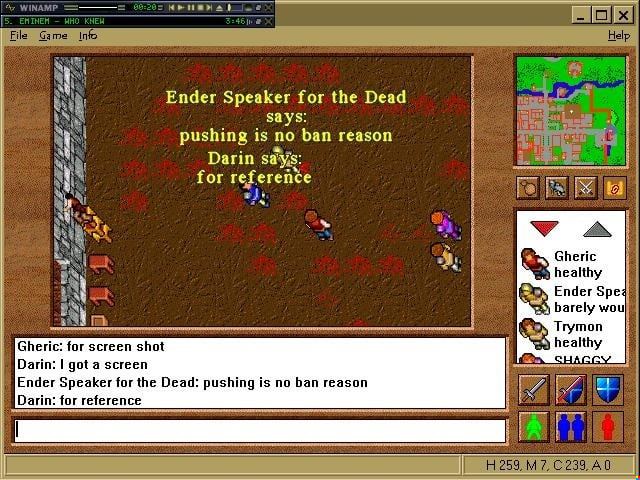
After the loss of the Wizard system bans returned to the cumbersome process of emailing CIP. Players would take screenshots of abusers and send them in, likely one of the reasons why we have so many screens of bad behavior as players were conditioned to save proofs. Volunteers would answer these emails and gather details before submitting to CIP for processing. This process took time to remove troublemakers which would easily recreate new characters and begin harassing again. I believe Kalen Leah answered many of these reports.
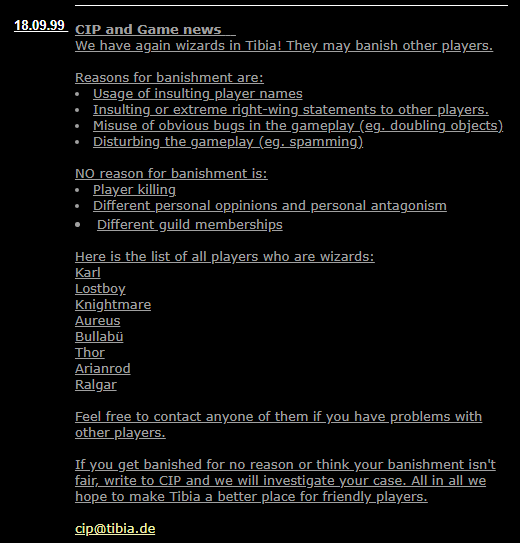
The program resumed with fresh Wizards on September 18th, 1999, with Tibia's most respected players, Karl, Lostboy, Knightmare, Aureus, Bullabü, Thor, Arianrod, and Ralgar. Though no new client was launched, it is possible that the system was reinstated because the workload pushed on CIP was more then they could handle. What is known is that Wizards could again banish players for choosing insulting player names, issuing insulting or extreme right-wing statements, misusing obvious game bugs like duping, and for disturbing gameplay like messaging players with spam. PKing, personal conflict and abuse, or guild membership were not reason to banish other players. The one exception to this was newbie PKing which was the killing of level one players. Those who were banished and felt it unjustified could email CIP for a review. Banishment duration could be set but where roughly around a week and were issued via the ban magic spell Omana Liber. The spell was "omana liber "name" 30 reason" which banned the player, provided the duration of the ban, and the reason which would appear on the ban list on the Tibia website. There is also a possibility that the IP bans where around which was initiated by the Omana Gran Liber spell which would block an entire IP number for 24 hours. Wizards could also teleport like their predecessors using the spell Alani "(player name).
Not even a month into the new system the name of Wizards was changed to make it less confusing with the mage vocations in game. On November 3rd, 1999, the Wizards would now be called Gamemasters (GMs). If you wished to reach a GM to report a rule violation you could now message every GM online with the new #G command which would show up as green text to every online GMs screen. You Typed #G "text here" in the text prompt and it would appear on their default screen. CIP hoped this would help make it easier for players to reach a GM who might be online rather than directly message a GM they might know, leading to the most well known GMs to be overworked.
The community by this point was already three times what it was when the old system was in place, so the small number of GMs were overworked anyway. To help, five new GMs were brought onboard on February 8th, 2000. Morgan le Fay, Gork, Deathwalker, Peppi, and Podi would now be available to assist players, increasing the likelihood you would find a GM online as they were chosen for their active times which was different than the original, mostly European GMs.
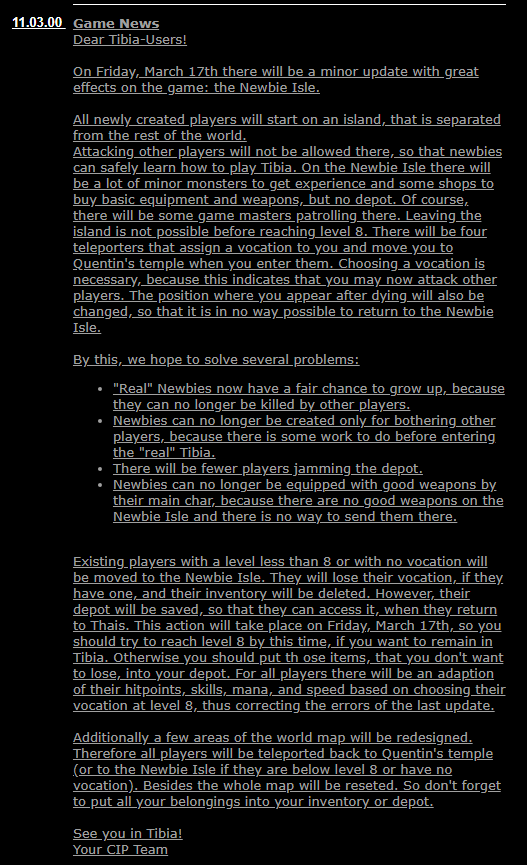
GMs were leading an exhaustive battle against banning trouble players that would spring up again with a new character a few minutes later. The effortless character creation process meant that it cost nothing for bad players to create a new character once banned and continue disrupting the game. Of course, the problems with new characters were also compounded by the fact that new players where chronically targeted by PKs and so couldn't learn the mechanics of the game before having their progress destroyed. To resolve both issues CIP decided that creating a starting island in which players couldn't kill other players, which would be called Rookgaard. This they hoped would both help by proving new players with a safe place to learn the mechanics of the game and to greatly increase the amount of work troublemakers would expend to create a junk char, hopefully discouraging them from doing so.
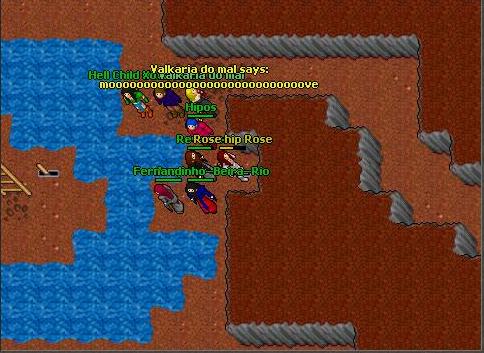
As players could not return to the island, CIP introduced Rook specific GMs though I think many of these players were secondary characters of other GMs except for Ender Speaker for the Dead who was new. These Rook GMs were: Schneff, Kahl, Seymour, ImaNewbie, Taib, Algol, Undine, Caldera, Arwen, Selrahc, Helios, and Rimun. This seems like a lot of players for such a small island but in the islands first months of introduction it was very packed. GMs on Rook would also be expected to provide help to new players who might have questions, and to deal with troublemakers who would now create junk chars to plague the island. Having dungeons which were a PZ also meant there was a lot of abuse with blocking areas or preventing leavers from operating. GMs playing on the island would be able to handle these issues quickly and their active presence might discourage bad behavior.
The final wave of new GMs in Beta 5 came on June 21st, 2000, introducing Kugan, Lady Rebel Rimule, Lujan, Matt, Rebel's Angel, Rohgat, Ruphus, and Shortl. Adding more volunteers to help with the growing number of troublemakers which seemed to find their way into the game. A continuously expanding GM workforce was necessary as the game was starting to increase as rapidly as the troublemakers were.

To encourage players to behave, CIP decided to publicize banned players. This system launched on the main website May 25th, 2000, and would show that rulebreakers would be excluded from the game, and to help save Wizards time as they could just refer players to the list if they asked about their ban. Each name appeared on the list in alphabetical order along with the reason for banishment, and the date the ban would end, refreshing every 10 minutes so new entries would show up. It was possible to exclude a name from appearing on the list if it was particularly reprehensible. Unfortunately, the list quickly became a criminal hall of fame for some groups of players. Players, including myself, viewed the list to see the hilarious and often creative names of banned players. Bans were largely anonymous though GM Deathwalker signed all his bans with his -D (-d) moniker.
This list is one of the few which has survived, and you can see from the huge never-ending number of players on it just how much work being a GM was. Each of these bans could result in a player disputing it, forcing GMs to waste even more of their time while they explained what should have been clear to these players. Sometimes a clear ban was not so obvious to others who were not present, resulting in a reversal of the ban. Despite the community's opinions that GMs were corrupt, very few of these players used their powers unjustly, thought that didn't stop the perception by the player base.

A growing community also creates a growing number of players who seem to live only to harass others. Harassing GMs for their work was a major problem and many GMs were unable to play on their main characters due to reprisals from the community for their work. It was very common for GMs to face attacks and though they had the special power to teleport to aid in their work, they were strictly told to not abuse these powers. They were constantly riding the line between fair and foul depending on which choices they made as they would have to decide at a split moment if they were being attacked by a random PK or targeted for their earlier ban. GMs actions were constantly under a microscope and the thankless role seemed to often clash between the vision the GM had for the rules and those of CIP, leading to frustration. Sometimes this difference could be chasms of difference such as the never ending debate on power abuse and its role in game.
The GMs role would continue to expand again with the new formal rule set which was laid down on November 22nd, 2000. Banishments are confirmed to last up to 30 days and even go as far as to block the IP-addresses of players for 24 hours. GMs were not limited to teleporting themselves but could now kick other players back to the temple. In the worst cases they could work with CIP to remove players from the game permanently.
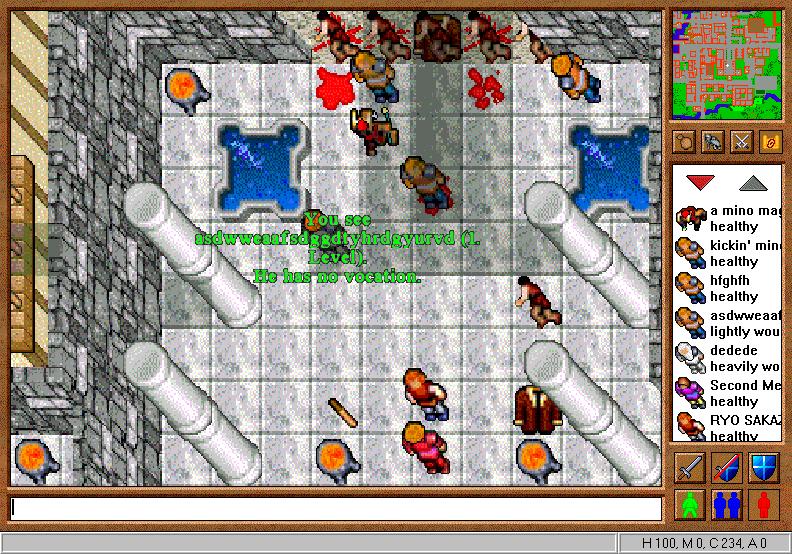
Rules for existing ban offences were kept but fleshed out with examples to make them clear to players. There were some modifications though, as characters with names which were un-fantasy-like were now a reason to become namelocked such as in sentences, combinations of letters which looked more like spam, senseless formats, objects, real life people, or created to be confused with other players. Many players disliked these rules, and many established players with names that no longer fit this criteria were banned which angered the community.
Thought you were likely to be banished for these offences before, insulting, sexist or racist statements were now officially banishable. Bans were also extended to killing players in protection zones which was only possible due to some design flaws which would eventually be fixed in Beta 5. Players were required to report players who abused game weaknesses, though I don't recall anyone ever being banned for failing to report an incident.
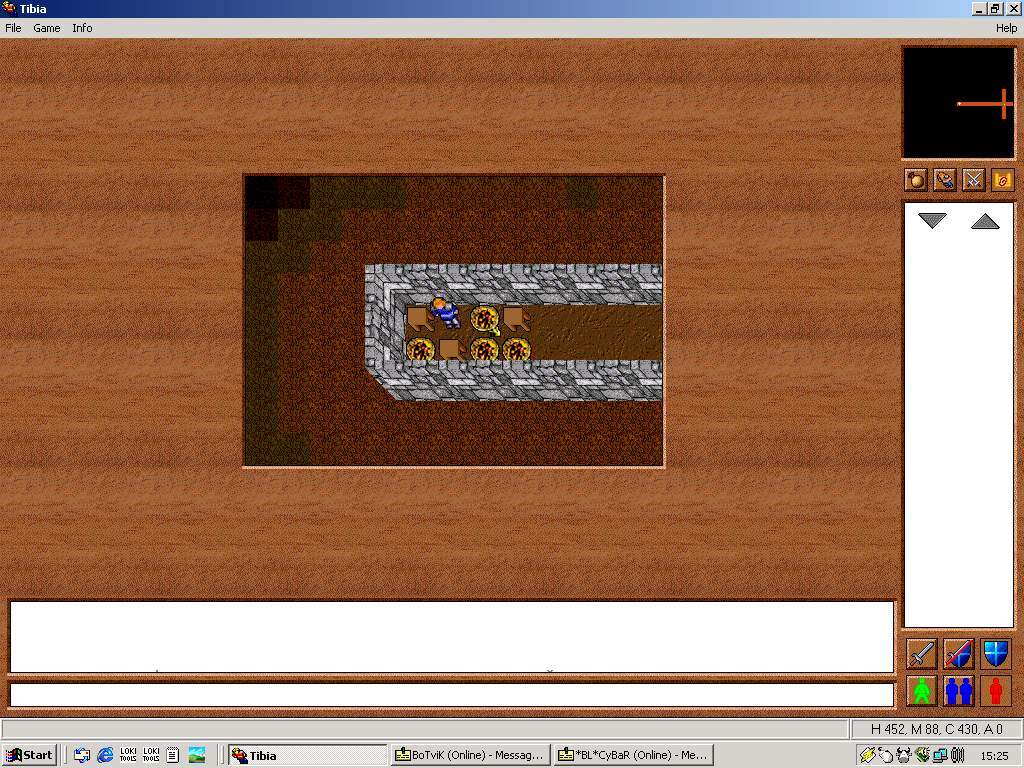
These game weaknesses included spam which was now defined to include overly long sentences. Other weaknesses were those which centered around PZs; a players safe haven in case of attack. Blocking a PZ or pushing people from them were punishable but were very difficult to catch in the act. Similarly blocking areas with unmovable objects was also a reason for banishment, though it was unlikely the culprit would remain in any visible spot for people to see and report. GMs at this time would have made many junk chars which they would log out in well known spots which were blocked so they could catch these players and ban them.
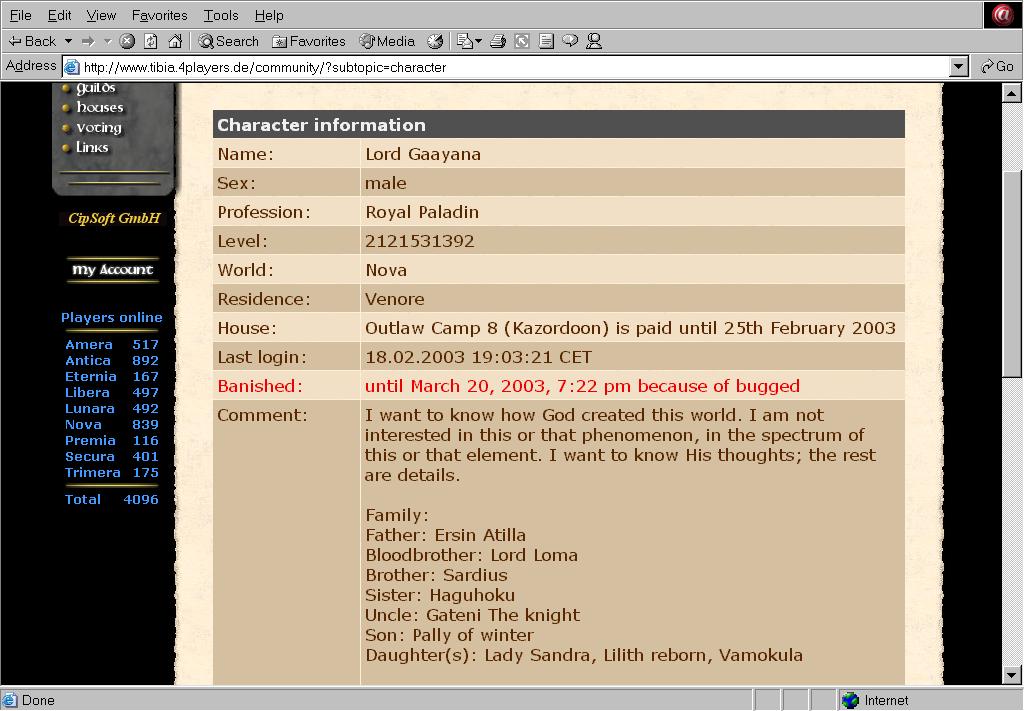
GMs were given added protection by being allowed to banish players who threatened them for their role or lied to them during investigations including submitting false reports or fake screenshots. Bugged characters were banished in every case and typically fixed by reverting to a previous state if possible. If an entire server received a bug, such as the level 1 bug which saw every character teleported to Rook as level 1 characters, then an entire reset was done to a previous server save. If the bugged char was created intentionally then it was likely deleted instead.
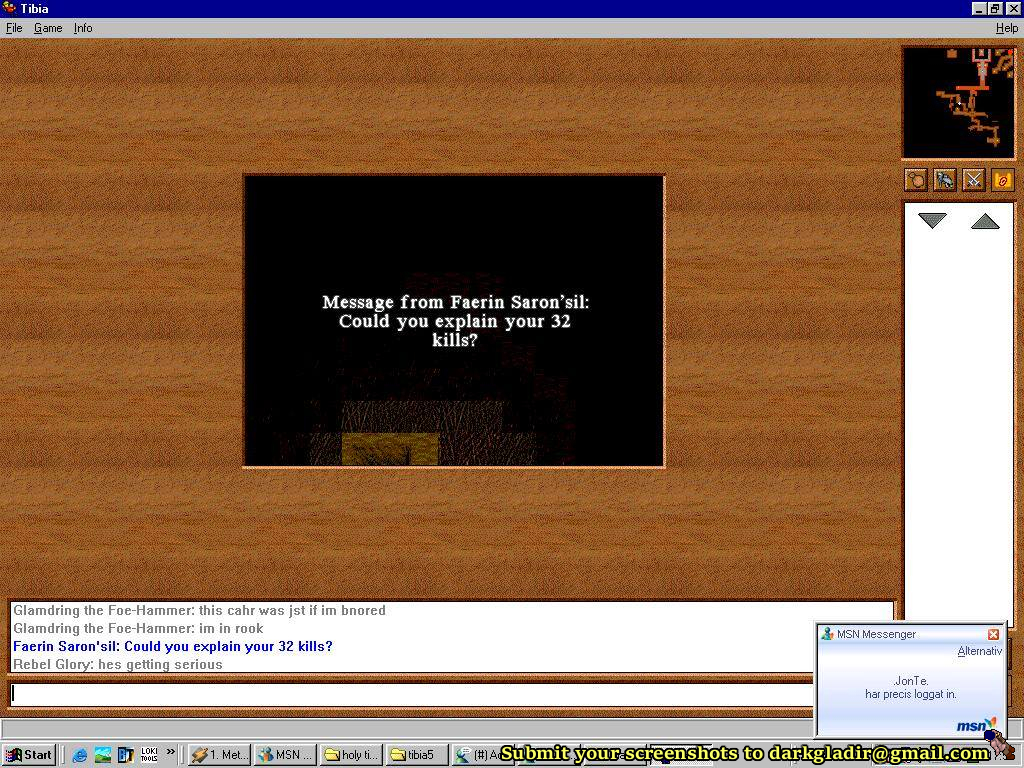
Even with the protection of Rook, players arriving to main would be targeted as they brought all their gold with them. CIPs solution was to make the killing of players under level 10 forbidden, but this was difficult to prove as you had to see a body with the killer's name. If you were AFK or disconnected, you might never know who you killer was, as you were kicked out of the game upon death and only on your body was your killers name recorded. Murdering higher level players was not forbidden, but massive PKing was now punishable under the nebulous heading of destructive playing. Traps with random targets were considered massive PKing, even if only a few players had been killed. If anyone received a ban they didn't think was justified, they could now complain on the public Gamemaster Boards hosted by CIP.
On July 21st, 2001, the account system was introduced which allowed players to finally have one login across all characters. Limited to 10 players per normal account, the login meant that GMs could now have their powers on any character they created on the account, not just their main character. To help further the account restriction was lifted for them which would help when the game began expanding to multiple servers.
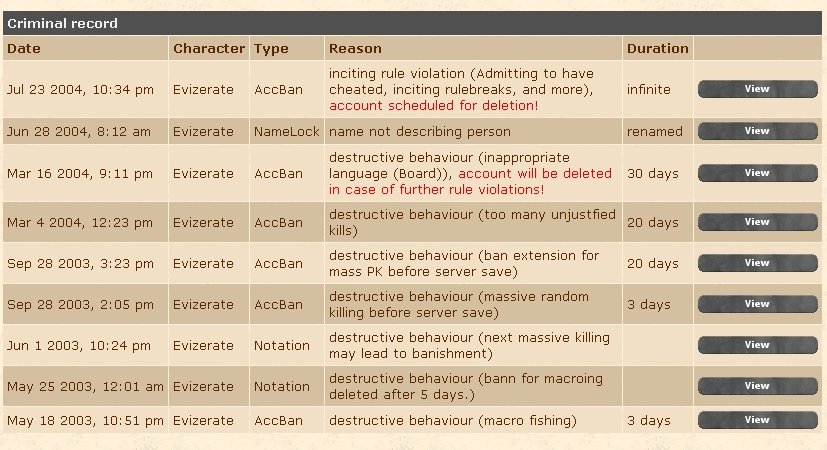
The account system also meant that a character banishment also banished the rest of the characters on the account. Nefarious players would have to create multiple accounts, not just characters. With the creation of premium accounts in the late fall of 2001 players were further incentivised to be good else they would risk being excluded on a paid for account which would cost them premium time.
On September 24th, 2001, the greatest update for Gamemasters would be introduced. Beta 6.3 was launched with features for Gamemasters, offering them many helpful tools. Before, players would receive a ban and once their ban was finished you would never know they had been previously banned. Now there was a criminal rule entry which would track these bans so players who broke the rules repeatedly could be dealt with more harshly the next time. This criminal record also synergized well with the new complaint feature which allowed you to privately message the GM who banned you for clarification, providing a formal complaint system. Anyone who lied about their bans in these chats would risk more ban time. This system also avoided the trial by the public which rarely was factual and often only succeeded in driving the wedge further against GMs.
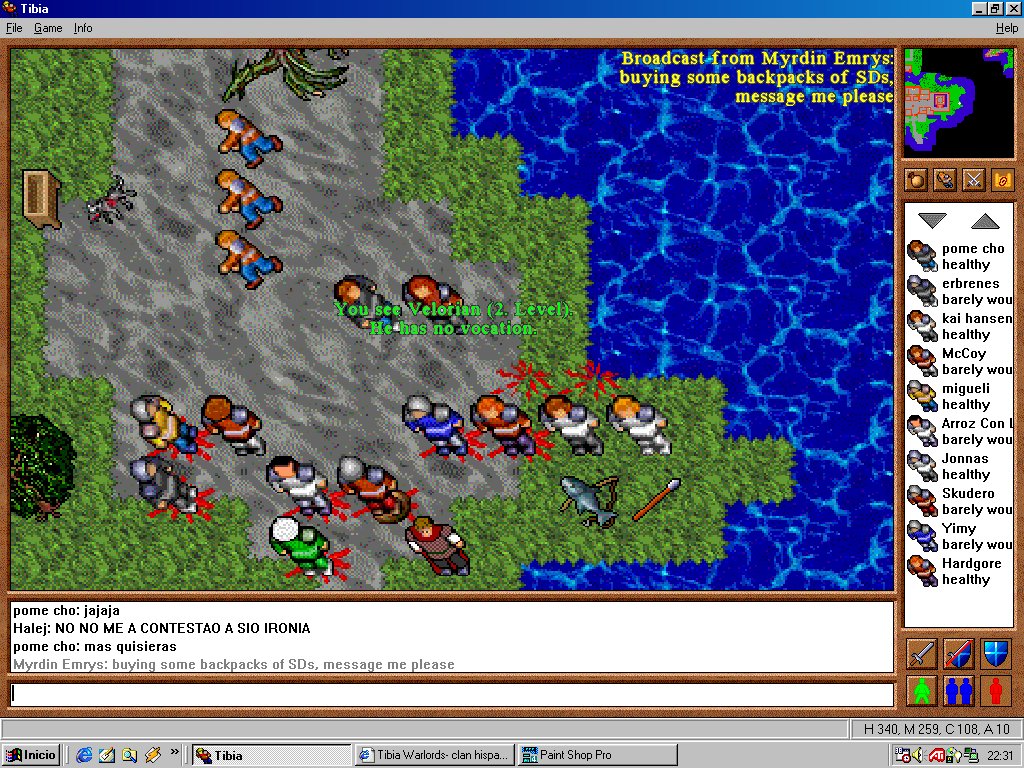
Also added was a GM immortal tool character which provided rule investigators with a safe method to check out rule violations. This character was only level 2 but had the fastest speed in Tibia and were incredibly quick, though a GM could set their speed to a lower amount if they needed to. Each tool char had no cap so they couldn't pick up items or equip anything, but they could go up rope spots or open holes without requiring tools and were ignored by monsters. The sprites for these looked like the new Hero monster which hadn't been introduced to the game yet but had appeared in test servers so players where somewhat familiar with them. Players were initially confused by this sprite and would try to attack the GM char even though no damage would result. Some of the screenshots from the time would make you think they could be killed but this was all tricks caused by NPCs who would lower your HP if you swore at them. GMs could eat food which would restore their HP again. One special note is that in this first version GMs could name these tool sprites anything they wanted so they often didn't say they were a GM. This would be changed to help reduce the level of scammers who claimed to be GMs by private messaging, as the GM prefix was not possible to use on non-GM characters.
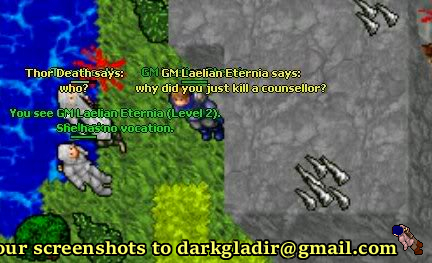
GMs would also receive the ability to deputize normal players in a semi-GM role, called Counsellors. Think of a cross between our modern-day Tutors and a GM character and that is essentially what a Counsellor was. This title was to assist GMs in their investigations, helping with the increasing volumes of complaints by players using the #G command. A Counsellor couldn't ban, or teleport and they did not have any immortal characters with capes. They were able to make a red broadcast to warn players of something which was used by the #B command and could also directly message a player with special text using @name@ which bypassed any ignore filters that the player had set up and would show as red text. There was also a #c command that both GMs and Counsellors had which would show up as red text in a specific channel, but I am not sure when this was added. This role was a great middle ground between rule enforcer and helpful citizen and many Counsellors became GMs which were voted on in the private GM board. Of course being a Counsellor came with its own hazards. Knightmare recounted in an article that "[t]he recruitment of a counsellor depended only on the decision of the GM. It was based on the personal impression a player had made on the gamemaster. This was a great strength as well as a great flaw of this system. On the one hand, the GM usually knew whom he dealt with and could judge if the reports of the counsellors had some validity and urgency. On the other hand, it was unlikely that a player outside the "circle of GM friends" would ever get a chance to become a counsellor."
I was a Counsellor myself and I can say from experience that the workload was significant as there was always someone who needed help and always something which required investigation. My time as a counsellor was spent mostly investigating cheating as Tibia's newest threat to the game had arrived with the advent of better programing tools.

It is around this time that cheating started to become more mainstream as the game moved away from its roleplay roots to become a more competitive product. Players in the early days, mainly PKs, used a tool called an aim bot which helped hit a target with runes perfectly and at rapid speed. As there were no spell delays then they could use the shortcut provided by this tool to rapidly destroy players. Despite this incredible power they still had the drawback of carrying heavy supplies and were vulnerable to literary everything.
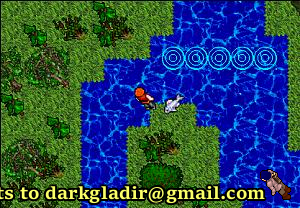
As the in-game economy started to improve, players gained levels easier, and the power creep started to show. Players began exploring tools to automate other aspects of the game such as with fishing bots which were popular as they fished the entire screen at the same time and would show as every water spot being fished graphicly. This produced a lot of fish which reduced the amount of work clicking each square and consequently players would gain massive fishing levels. Cheating of this kind was very easy to spot as it was clear based on the high scores who was using a bot. The tolerance for this form of cheating came to an end on October 16th, 2001, when macros were officially forbidden. Anyone who suddenly appeared on the fishing high score would find themselves banished for macro use.
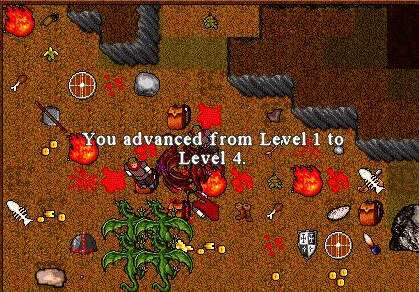
With the introduction of Edron on November 2nd, 2001, the GM sprite received further confusion as the Hero was now in game and looked exactly like the GM sprite. I recall walking in Edron and seeing players try to attack the GM and become confused, asking if the monster was bugged. The new tool character was problematic as it couldn't attack or have cap but was able to gain experience under certain conditions. During the initial test it was discovered that you could push a backpack of LMM which had a magic level requirement of zero and fire the runes to kill monsters. This way you could level your GM tool char. Of course this was changed before the GM update.
Many players during this time also stopped hunting in the free areas of the main map and instead moved to Edron to hunt as there were fewer malicious players. Paying for Premium was difficult and most players where cash strapped, so few risked their premium accounts by causing problems. Despite the risk aversion to bannable mayhem, GMs would still have to contend with banning paying players which could impact CIP financially. At the launch of premium accounts, CIP was reluctant to ban premium player for more then three days and GMs had to go out of their way to prove their case for an extended ban. CIP would almost always review cases of banned premium players, and GMs had to often reban players at the end of a ban to extend the duration for more serious offenses. Many bans were cancelled, and premium time refunded for the lost days.
To help discuss ban lengths and argue for longer sentences, GMs received their first internal boards on CIPs website, and a channel to discuss rules in game. This would replace the back-and-forth emails and likely sped up the discussion process as others could weight in and resolve a mater over relying on a single email participant.
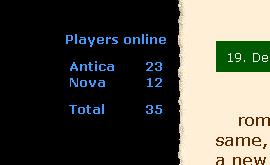
On December 19th, 2001, another major change came to Tibia. GMs would now have to fight rulebreakers across two worlds with the introduction of Nova. The #G call to message a GM only pinged the GMs currently online on the world it was used, so GMs had to try to be available across two servers. This meant that finding a GM was almost as challenging as proving a rule violation, which led players to try to create characters on other worlds in the hope of catching a GM online. For years this problem would persist, and some conspiracy theories of the time believed that GMs deliberately favored some worlds when the reality was the GM was always going to be online more on their original world. Further world expansions would make this even more of a challenge, which is likely why the population seems more inclined to rule break and even did so openly.
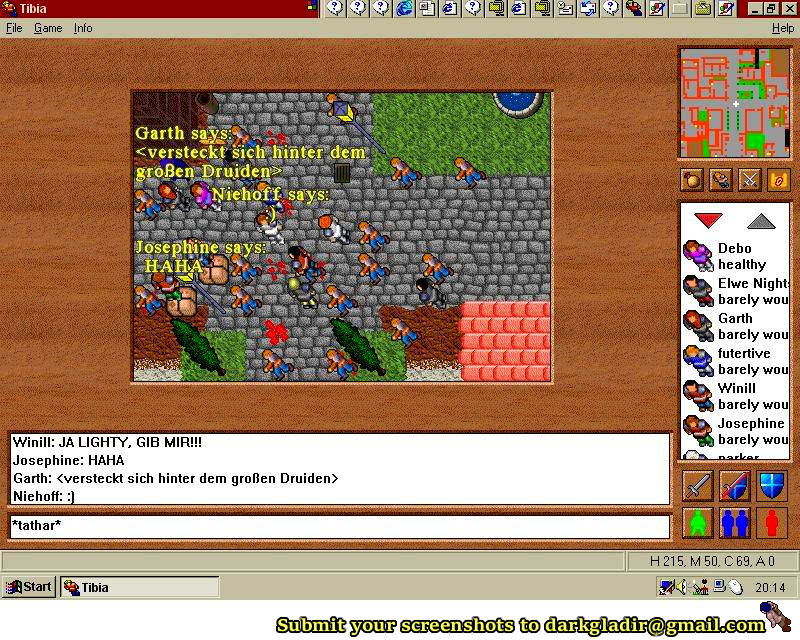
To cut down with the high level of hacking, of which many complained directly to GMs, CIP added a 30 day wait to change your email. If anyone nefarious broke into your account, they could no longer immediately change the email to their own. Hacking and related problems was a big issue for GMs during this time as they were constantly called to urgently to ban characters who where hacked. Many characters like these went on PK sprees, or tried to Rook themselves, destroying the hard work of the player who owned them so the only way to halt the damage was to have a GM issue a ban. When my character was compromised, I was also banished until I could reclaim the account and change my password. Proving the original player was back in control of the character relied on those who knew you in the community, who would vouch for you, often asking you questions that only you would know. GMs had to decern who was a friend of the hacked character or not before they cancelled the ban which could be tough for lesser known players.
With the plan to increase the amount of game worlds, more GMs were needed and on Feb 18th, 2002, some new GM were given their cape. The GM group would continue to expand over the years and as many as were brought on, more would go inactive and retire so the workload never seemed to decrease. I have tried my best to chronicle as much of the changes to the force as possible which can be found here.

One other big change that occurred around the introduction of Premium accounts was the creation of the Senior Gamemaster (SGM) system. Three players were elevated to the rank, Taghor, Knightmare, and Lilannan which where some of the oldest and most knowledgeable Gamemasters. These players would act as mentors to the other GMs by answering questions and providing a second opinion on bans or rule interpretations. A SGMs responsibilities included ban extensions, which were final and could not be complained against, and managing the GM workforce to ensure coverage and activity.
With the introduction of the house auction system, GMs now had the additional task of disciplining players who actively disrupted auctions by bidding and not paying. This extra work was not an automated proceed at this time so GMs would have to manually ban these players based on complaints from other bidders or would have to watch the auction pages themselves for repeated violations. As you can imagine this was an absolute headache and most GMs couldn't spare the time unless a clear and obvious occurrence happened. Many house auctions were ruined without punishment as a result.
GMs also now had the power to delete or edit entire guilds and banish players for rule violations revolving around the new guild system. Players who created guilds with the purpose of circumventing the rules would find themselves excluded from the game. Both this and the auction ban responsibilities where the first time that GMs would have to police activities outside of the active game.

It is around summer of 2002 that another serious change would come to Tibia. Players were coming to the game in record numbers, but many players felt that the game was too grindy or that they were too far behind older players. Some cleaver programmers of the community found that they could create programs which took care of the more mundane tasks of the game. What started out as fishing macros turned into anti AFK rune makers which would auto log if another player popped up on screen. From here it did not take long before a real sophisticated bot came to Tibia. If Gamemasters felt they were overworked before then the massive work needed to banish cheaters would show them just how ineffective they were against sophisticated bots. GMs would not be able to banish players for cheating directly until it became a rule violation on March 8th, 2004, but they could banish for macros, for destructive behavior, or in some cases for obvious multi clienting which had recently become illegal.
The rise of cheating in Tibia deserves its own section so I won't speak much about it here, but cheating became so widespread during the 2000s that it is estimated that over half of Tibia's players where cheating in some manor. Many fair players in the community hated botters and the game became very toxic as these cheaters often created characters at no cost and had their fun terrorize the community with their creations. Even if the playerbase could kill a destructive player, they would just come back later with even more levels and an endless amounts of money.
Botting and the community's boldness in engaging in open cheating is perhaps one of the largest reasons why the community disliked GMs as cheating appeared to be sanctioned by CIP and players resented being punished for an activity other were not. Much of the time cheating had such a huge leg up over others that you almost had to engage in it yourself just to keep up. I believe much of the old guard style guilds fell to irrelevance because of how much other players were cheating so they couldn't perform the role of policing the community anymore as they were not longer the game's highest leveled players. This shift really put the GM role in a spotlight of irrelevance as well, so I believe the community saw it as an archaic system that only disrupted the fun of the game.
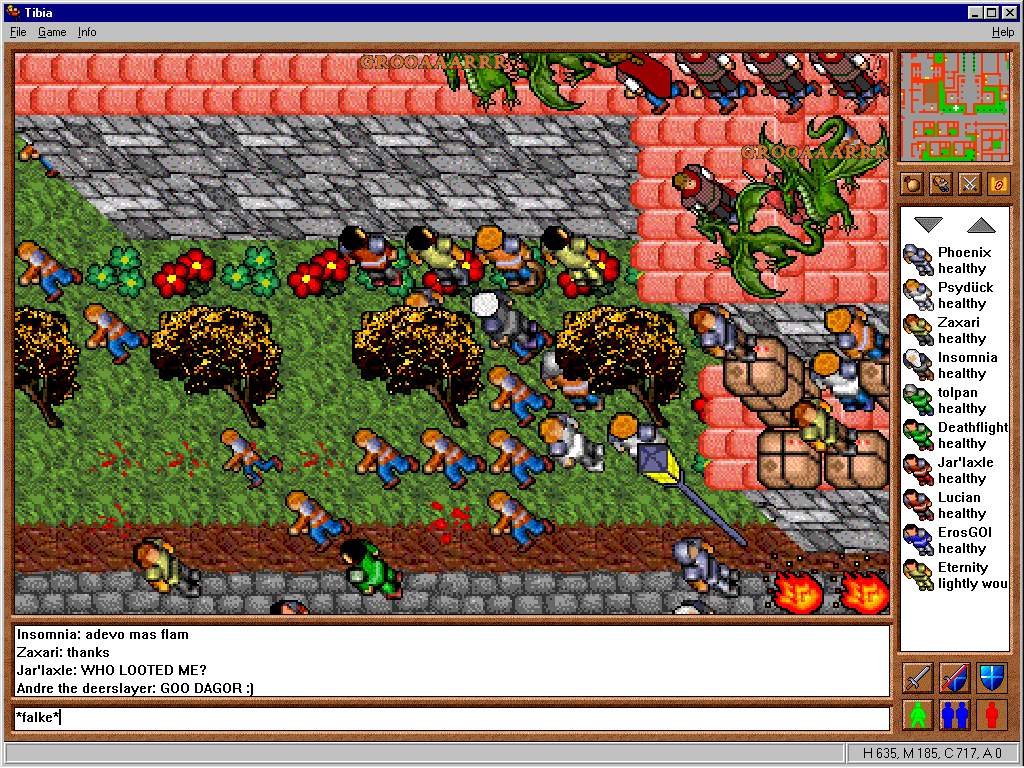
GMs were always in the spotlight the moment rumor spread that they had showed up at a quest or aided in a situation that players didn't agree with. In one case I recall the first POI quest in Tibia where the entire kill team got kicked on Antica due to a server crash and GMs had to arrive to corral the monsters until the team could log back in. Many players called this unfair and complained about the abuse of power. This was not the first such incident and it was not unusual for a GM to use their tool char to accompany quests and observe the progression without aiding. Sometimes GMs where needed to clear a dangerous situation such as the time Falke arranged an RPG end by having Genesis GE summon Dragons. Genesis unfortunately was kicked which resulted in several high levels dying and losing all their items. GMs assisted with blocking the monsters while Dagor Dragontooth came to clear them out and rescue the loot. In some situations, the arrival of a GM wrecked the quest like this case I found where a GM popped up in a critical spot a blocker was trying to move to which resulted in the death of everyone in the room. Many of these cases fell in the grey area of the rules and the fairness of the aid was debatable.
The growing community distrust towards GMs was also not helped by several large scandals involving GMs cheating or otherwise breaking their oaths. Other then the case of Alatar back in Beta 5, I recall Bullabü's GM character getting sold to Mortor/Warrax sometime in 2003. There was a rumor that the GM character was used to break into the new Edron Behemoth quest and take the Thunder Hammer, which was the most powerful weapon in player's hands. This room was considered incredibly difficult due to the volume of difficult monsters inside. Other places which were difficult to access due to creature densities were likely also looted such as Demonia which provided the very rare Crystal Wand that appeared in Warrax's house in Thais. At some point it was discovered that the GM account had been sold for some Euros and all three accounts were deleted. According to my conversation with Warrax he tried to genuinely play the GM character fairly, but ultimately fell to the temptation of cheating.
He would not be the only one who would resort to cheating when the opportunity arose. Rumors of other GMs such a GM Pepelu using his GM characters to block for him circulated the boards with apparent screenshots of the issue rumored to exist. One person, I recall, even sent the documentation to CIP, but nothing became of it. He was not the only one accused of using the GM tool to aid in leveling, and the community thrived on repeating the rumors.
GM Deathwalker, the well known and respected GM who led the Du'Vark Family was also deleted when he abused the Greenclaw Swamp duping bug. You can read about the bug in detail here, (Greenclaw Swamp Bug section) but though he claimed that his actions in the bug where to isolate the cause, Guido deleted him believing this not to be the case. This shook the community as many believed in his sterling reputation and distrusted the words of CIP. Others saw the incident as further proof that GMs were corrupt and would abuse bugs like this at the first opportunity.
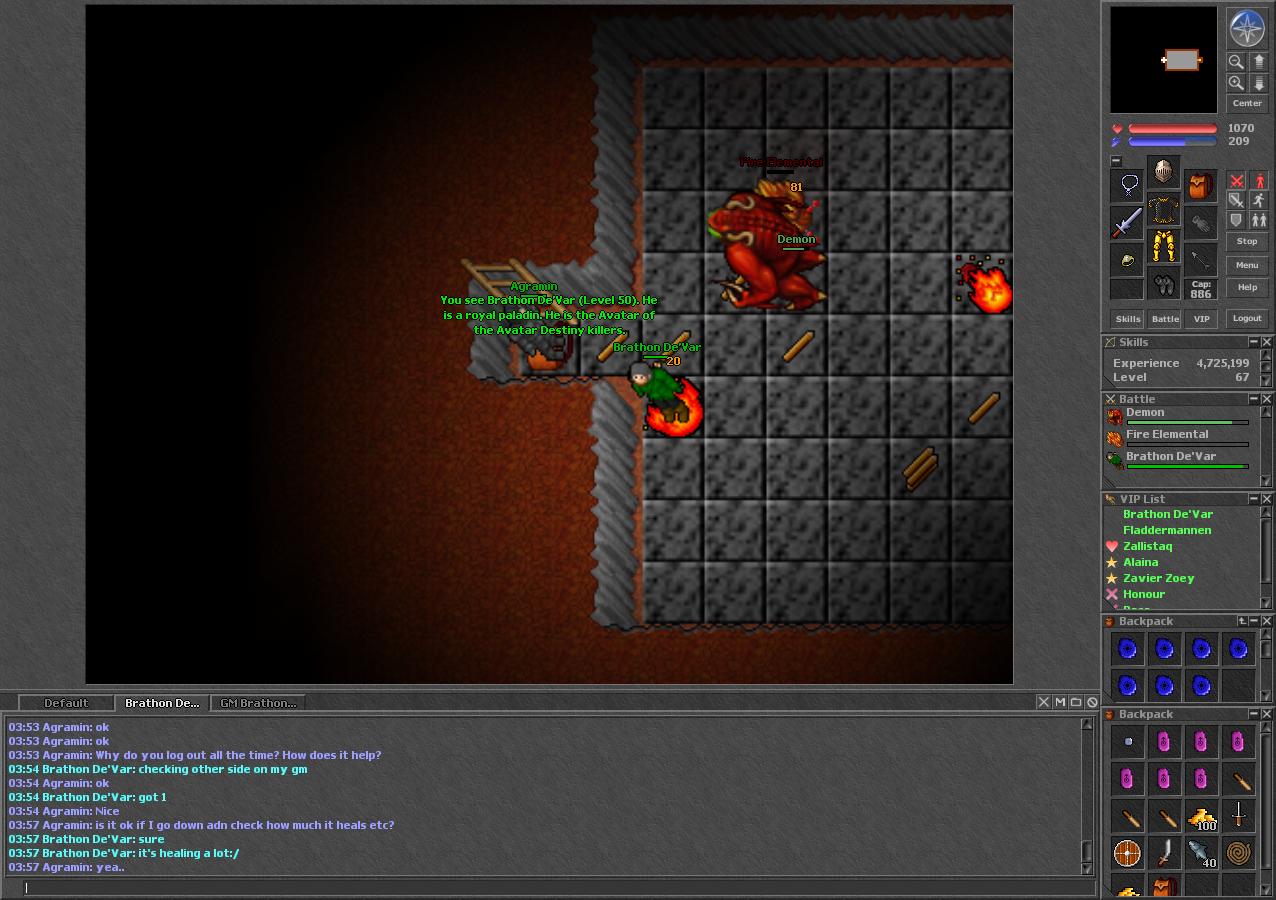
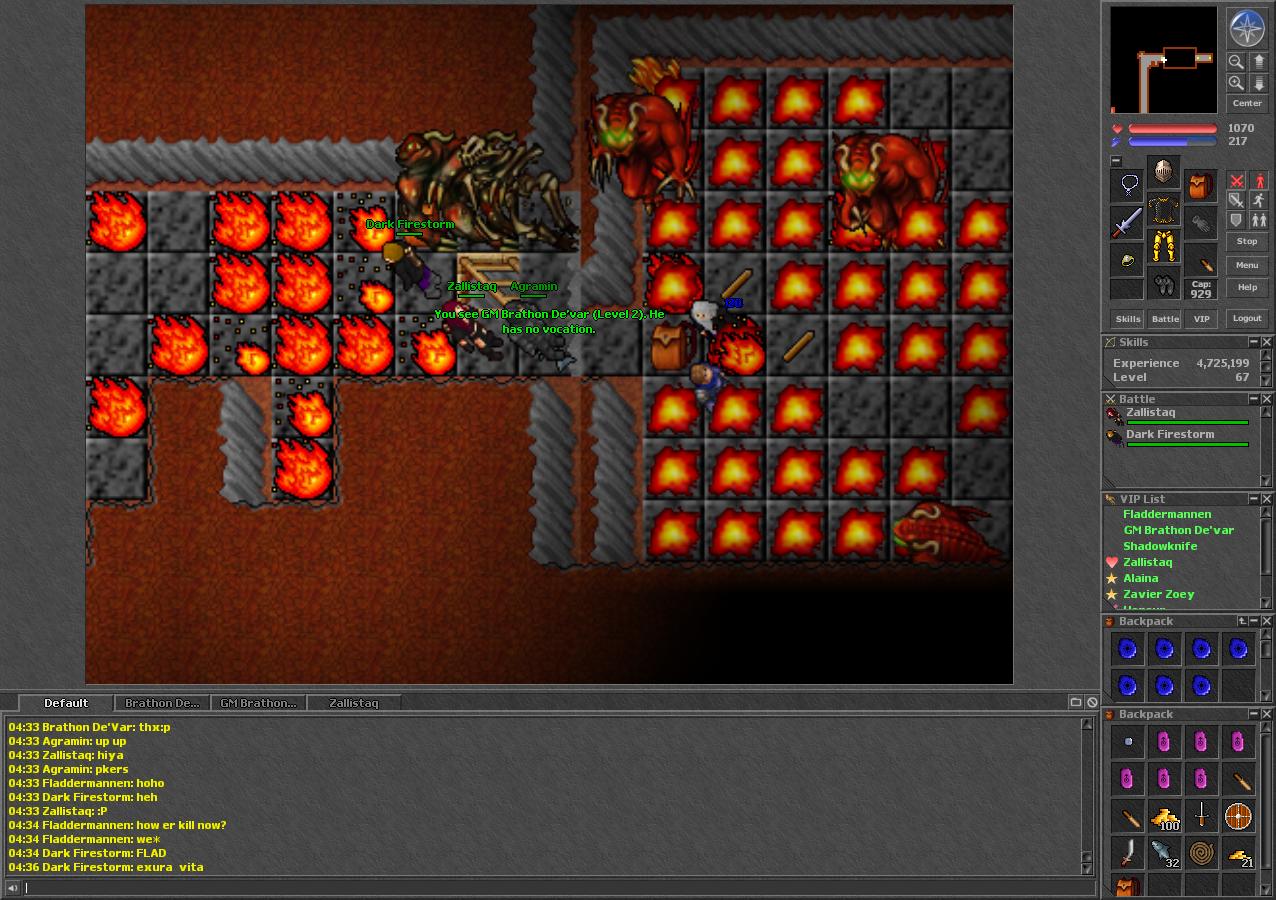
Though the community may have been divided on Deathwalkers deletion, this was not the case on the deletion of GM Brathon De'var. I recall the case of GM Brathon De'var who became a GM around the end of 2002 and just 6 months later was caught for breaking into players houses and stealing their items. From what I gather it involved the GM teleporting (TP) to players who were inside the house and then throwing the items out later to an awaiting character. He started with low value items which were easily missed and escalated to rares like the Great Shield.
I recall that during the investigation for this, Guido thought that I was responsible as I had recently come into some due to the Premia Thunder Hammer quest. He TPed to my location with several GMs at our hunting camp in northern Orc Land and began counting down. Everyone in the camp scrambled away in a hurry to avoid whatever disaster the well-known chaotic god had planned. His surprise UE was fatal those any who where indeed AFK but I had long fled by that point and only saw the blood stains later.
While I was running away Guido TPed to me and began interrogating me for the crime, but I really had no idea what he was talking about and scrambled to try to figure out what he was accusing me off. I fortunately had bought my recent rares from reputable sources and was able to prove that I had nothing to do with the crime by franticly messaging Marduk, a well known and respected player, to vouch for me to Guido. Just as quickly as he came he disappeared without an apology, likely angry he couldn't legitimately hammer me into oblivion.
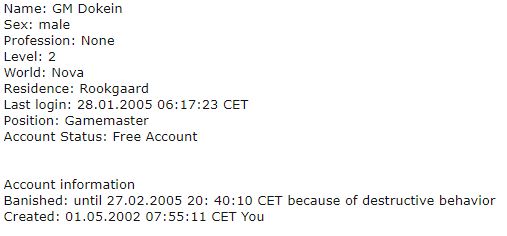
It would later turn out that the corrupt GM would have their account deleted for the deep betrayal of trust, a punishment which would echo through every corruption incident. Unfortunately, what was lost was difficult to prove so Guido refused to compensate players who had lost items which only further deepend the anger the community felt towards CIP and the rule enforcing team. Their feelings would only intensify when GM Dolkein sold his account for $600 bucks to a nefarious player who then proceeded to use the GMs powers to TP, ban, kick players during a war with another guild, and in one serious case fabricated a deletion. A topic about the incident was posted on the boards and the player originally behind GM Dolkein posted that he sold his account because "Cip just wants to make money with the game, they forgot RPG game, so why not profit from it?"
Tibianews interviewed Knightmare about the incident who remarked that "Dokein's act is water on the mills of all people who see the current GM/counselor system as disfunctional. Dokein severely damaged the chances to appoint new counselors or GMs. At a given point the necessary amount of monitoring would defy the idea of GMs and counselors helping the community managers out. We are constantly improving and expanding though. External GMs and counselors, are a good thing in general and we don't want to discard it for sure. New tools and shifts in structures are steadily introduced and under development and will help us in our responsibilities and in maintaining the needed contact to the GMs and counselors."
Though the false bans and deletion were reversed, the damage to the rule system still lingered behind in player's minds. Doubt about the system would continue to grow and fears were not limited to giving capes to the wrong players but sometimes with CIP themselves.
Taghor recalled in an interview that "[a]s SGM's we were fighting on 2 front-lines: Against the players we had to defend CIP and calm the people down, and the other front line was our forum board together with Cip, where we always complained about them and fought hard to get them to fix bugs and support the community. Guido gave me the nickname grumbling dwarf (Taghor is a dwarf in RPG way) because I was never satisfied with their ideas ;-)"
Guido, one of the later game founders and the most visible face of the CIP team, was often found to treat the game like the wild west. He was the sharif in town and his view superseded everything. Most of the players who ran afoul of him were troublemakers or perceived to be troublemakers which was often as bad.
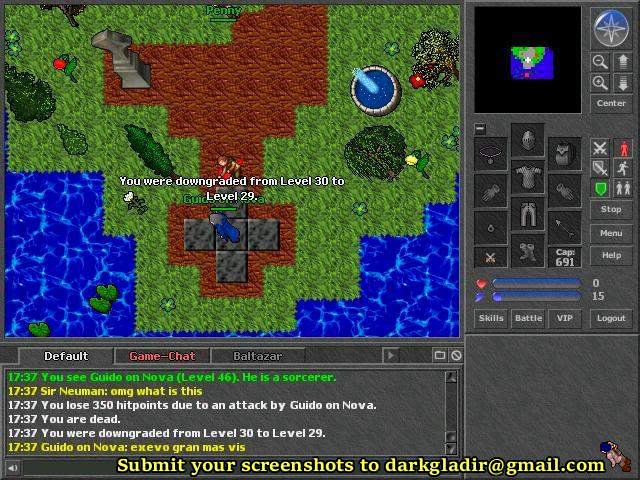
In a famous example of Guido's antics, Jeremy was teleported on his PK char Sir Neuman to GM Island and then killed by Guido. Jeremy was a well-known PK but Guido taking direct action was usual. Another case I remember Guido summoning Behemoths to kill Halfhigh, a high-level player because he believed he was cheating due to the volume of monster killed. Behemoths were very difficult to kill when they were introduced with Edron and Pepelu and Halfhigh had found a way to hunt them without taking massive damage by exploiting the fact that monsters didn't retarget if the initial player remained in range. Guido disliked this and punished them by killing them with the summons monsters. Monsters would be changed after this point to change targets to defeat this strategy.
His firebrand personally clashed against my own and Guido and I's fights where well known and often public. We never got along even though I worked as a Councillor, and I fought with him on the boards and in the GM channel about everything from rule interpretations to also how some banishments were handled. My close association with some of the more well-known players who partook in the seedier side of Tibia resulted in him assuming I was cut from the same cloth. Any punishment they received I was warned that I would receive as well if he could find the proof.
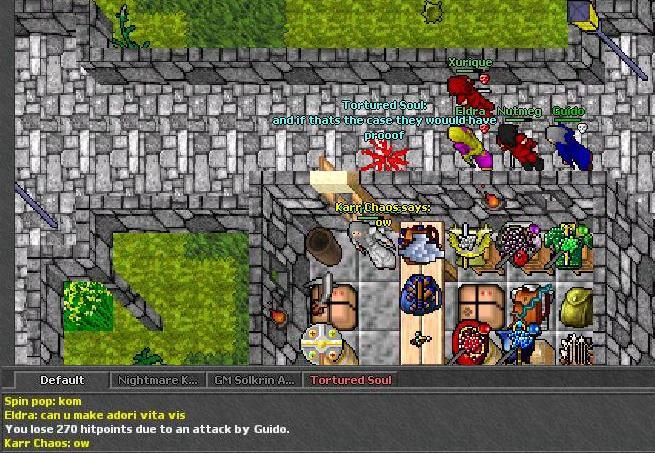
In my well-known defense of Smoke, I showed how Guido would edit bans and adjust records even after the punishment had been served. The end results of that defense, which was very public and talked about, was my own banishment after Guido's arbitrary dismissal of clear evidence and my angry rant to Community Manager Solkrin. Guido was apparently standing over his shoulder and read my heated words from his screen and decided this was worth a public display of force against me. An SD and a week ban later I returned to the game without my Councillor title, but the magic of the spell of the game was broken and I would quit for many years less then a year later.
Though these incidents make for great stories years later, they were clear example then of why having the front face of Tibia as a chaotic player was not a great look as it drove the community to emulate the behavior, believing it was acceptable.
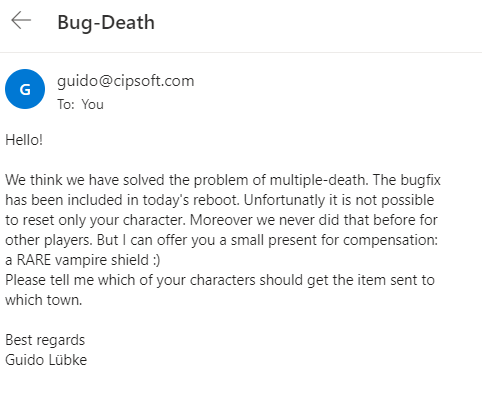
The double whammy for Guido's behavior was that his tough exterior was also one of tough love, where he would deny others compensation for the damages caused by bugs or though the abuse of the game's own systems. Many players disliked these unfair practices and each incident where a player was burned by the game resulted in more players leaving for good. When I had first began Tibia, it had been a place with violence, but it was never to the point of total unfairness. Players where mostly respectful and even PKs would often help you out after killing you. The Tibia of the 2000s was a very different beast and leaned much further towards the dominado nonsense we have today. Chaos and decadence turned the game more towards a graveyard then the open sandbox CIP preached.
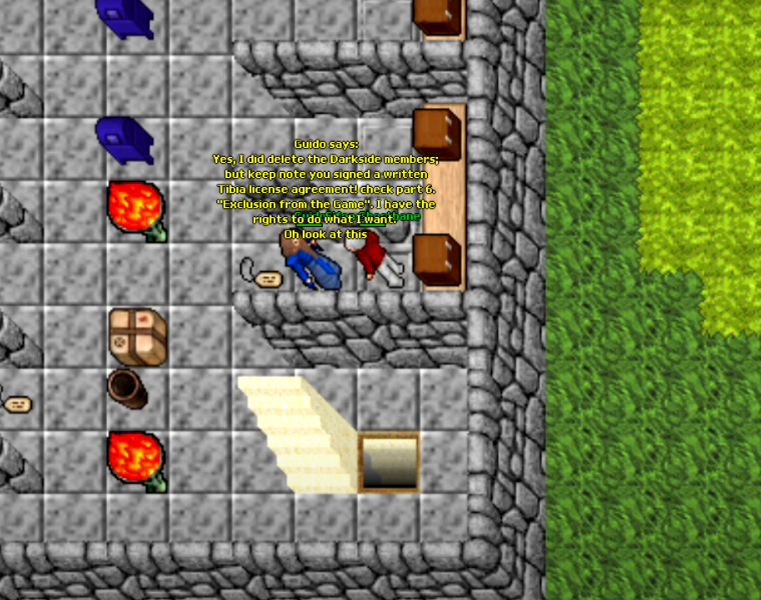
Despite the chaotic justice which intensified punishments, CIP was often caught in the difficult position between generating income to run the game and making sure the game was fair for players. Often, they would side towards making income which allowed Premium players to go unpunished like in the case of some players continuing to sell Premium time even though this was illegal. This unwinnable position is likely why CIP would later discard their Destructive Behavior rule in favor of allowing the community to police itself. Even though most of us understood the reality of a commercial game, this dichotic relationship still helped to sour the justice-oriented portion of the community who wondered why they played fairly when no one else seemed to even care. Wurzel famously botted up a character over night in a public display to prove how easy and destructive it was and earned a deletion for his efforts.
Maybe Guido's chaotic tendencies was his way of releasing stress for being overworked in a seemingly never happy community? What was clear was that more help was needed, as Guido should have been focusing on his Executive Product Manager role but was stuck sifting through endless emails of complaints.
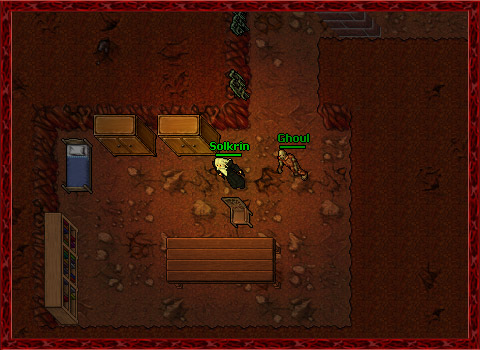
To help with the huge volume of customer support emails, CipSoft's first employee was hired to the new Community Manager position on July 2003. Solkrin would now be responsible for answering the large volume of emails, managing the GM team, and writing text for the website - basicly Tibia's customer support department. According to an article from CIP, it was obvious that one person couldn't do this position so a further three Community Managers were hired in 2004, two more in 2005, and four more in 2006, giving a great deal of support for the exhausting position.
The role of a Customer Support is quite massive and its worth reading the article about what their job actual entails to be able to appreciate it fully. Many people like to harp or even sometimes threaten the Community Managers for the challenges of the game, but I think this behavior is incredibly unfair. Managing a hostile community requires tremendous patience and a thick skin. It's unfortunate that our community's most toxic players seem to have a disproportionate amount of leverage over how the Community Managers are perceived.

Though I've only worked with Solkrin a little since he was assigned to me as my GM contact when Eloslaydar retired, I have nothing but good to speak of him, and he really pushed hard for me when I questioned the deletion of Smoke. He even pushed to the point where he was questioned about the favoritism shown to a high level, as no other ban had been scrutinized to this degree. Even when our crusade for justice ended abruptly, he remained pleasant even as my frustration tipped over into anger. It is very clear that CIPSoft made the right choice with Solkrin and the creation of the Community Managers, even if few others appear to appreciate it. By hiring their first employee, the CIPSoft company began its journey towards in-house rule enforcement that would neither have the bias of players or the arbitrary punishment by game creators. The move in this direction would take another seven years, but few believed it would happen.
With the 7.2 update on December 16th, 2003, came more change to game as CIP added the Tutor position, which would work alongside Councillors. This position was like a Councillor but included no special powers, and Tutors didn't have any special way to msg other players or the red text broadcasting spell. Instead, these players where primarily focused on helping other players with questions. Tutors had access to their own board and could dispense advise in the help channel which had been newly created.
To further help with the workload of GMs, the Senior Tutor position was created on August 12th, 2005, which had all the same duties as a normal Tutor but could also report character names, bugs, and even rule violations on the public boards and forum. A Senior Tutor had no authority over other Tutors and would automatically be upgraded to this rank if they where active for at least 3 months and had no negative reports on their account (having one delayed their advancement by 8 weeks). This position was like the spiritual successor to the Councillor position but without the extra GM like powers.

With Tibia's first Community Manages now managing the game the need for SGMs was no longer needed and the position was eliminated, and their responsibilities moved to the new Community Managers. This change occurred on July 14, 2005, and all previous SGMs returned to normal GMs. Leading GMs would now be the exclusive domain of CIPSoft employees. The Senator position was also created at this time which would be comprised of retired GMs, Counsellors, or Tutors who honorably fulfilled their role and would now act in an advisory capacity.
The Councillor position would continue until its official closure on May 16th, 2006. Senior Tutors were already doing most of what councillors did so those who where a councillor now became a Senior Tutor, or their rank was set to Senator if they chose to retire from active work which was more of an advisory role. GMs would continue to be tapped from the Senior Tutor ranks, so few Councillors minded the change.
After more then a decade of battling the community on rule enforcement and three years after the popularity of the game had peeked, CIP announced March 3rd, 2010, their vision for the future which choreographed the end of the GM role. Their vision, which to be truthful was already evident years earlier, was to eliminate rule enforcement by players. This would also eliminate any perceived bias by the community as all decisions would be made by a disinterested 3rd party which was a paid employee. Rule violations handled by paid professionals would also prevent players from using their powers for their own ends which was a common complaint. CIP also envisioned eliminating the report limit so players could report multiple instances of rule violations rather then deciding on one. They also wanted players to play the game and not have to wait to find a GM online to report an incident, and they wished that a report once sent would stay active until seen by an employee (presently they disappeared once you logged out). CIP felt that the elimination of ambiguous rules was also important as it would eliminate the need to debate their interpretation which had consumed most of GM's energy on the internal boards. Finally, a rule break was now seen as a private affair and would no longer be advertised the way it had in the past, first by a public offenders list, and second by the length of the ban being denoted on your character.
Oddly, the position of CIP radically changed with the release of this article to move away from enforcing rules in an absolute sense and instead only in perusing rule breaks where another player is harmed by it in some way. This departure felt like rule breaking was now unimportant and with the way bots were becoming increasingly popular it felt like a slap in the face for fair playing Tibians. Quite a few players began to leave, fed up with the bots and no longer interested in dealing with increasingly hostile in game conditions. Shifting away from strong enforcement against rule breakers allowed the community to head in the no rules sandbox that we have now ended up with, filled with toxic dominados and extortion to even play.
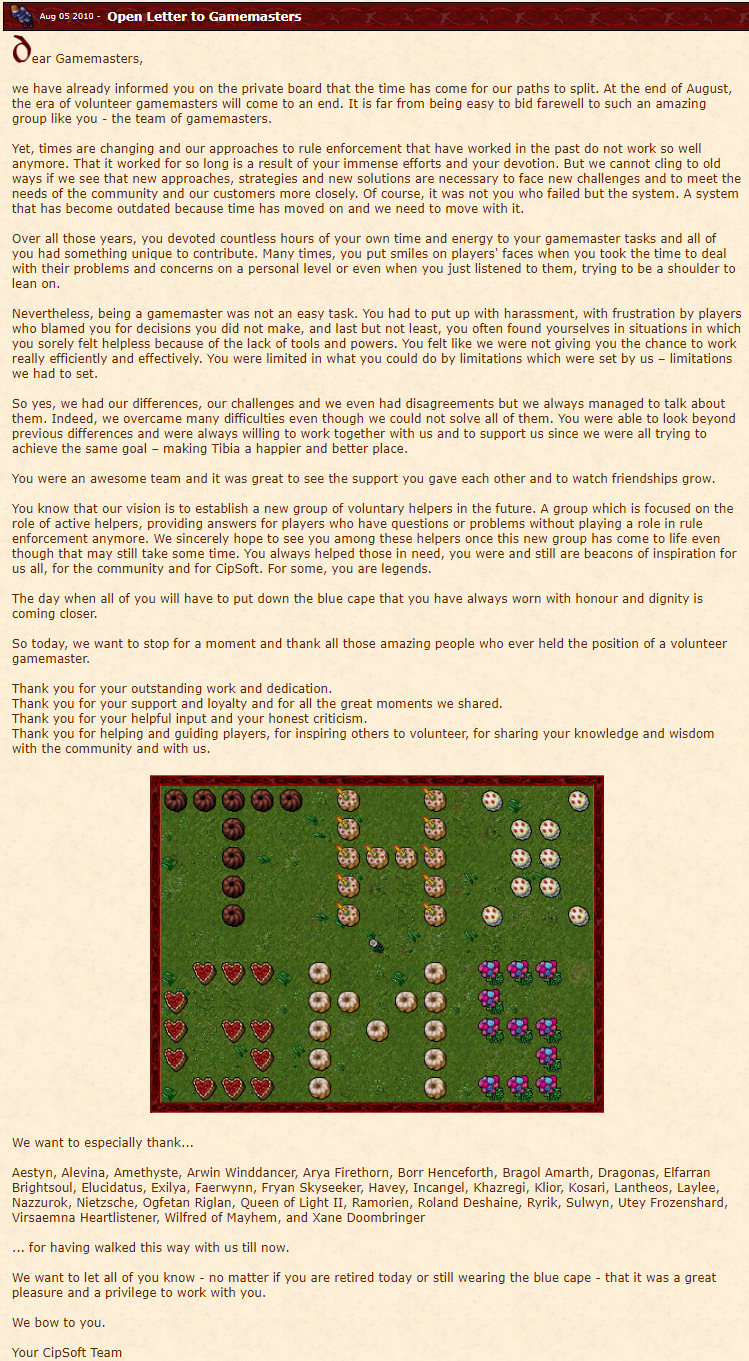
Just 6 months after CIP had announced their plans on August 23rd, 2010, they closed the GM system. The changes they had made to their internal tools and staff during this time was enough for them to move the GM job in house. All GMs were returned to normal accounts, all tool characters where deleted, and each player was given either Senator or Senior Tutor rank. As a thank you for their hard work each GM was also given a Gamemaster Doll with an inscription and the choice of a free item between: Dark Trinity Mace, The Epiphany, Ferumbras' Hat, Great Shield, Solar Axe, Rainbow Shield, Royal Crossbow, and Snake God's Wristguard. The Solar Axe was by far the more popular choice (was the most powerful weapon) followed by The Epiphany. Some GMs elected to not receive any items and a few others where too inactive to make a choice and thus received no farewell gift. I know that only one of the Dark Trinity Mace was chosen but most of the choices of the 32 GMs remain a mystery. Though the GM role by volunteer players was gone, rule breakers continued to be punished by CIP employees, and Tutors continued to help players.
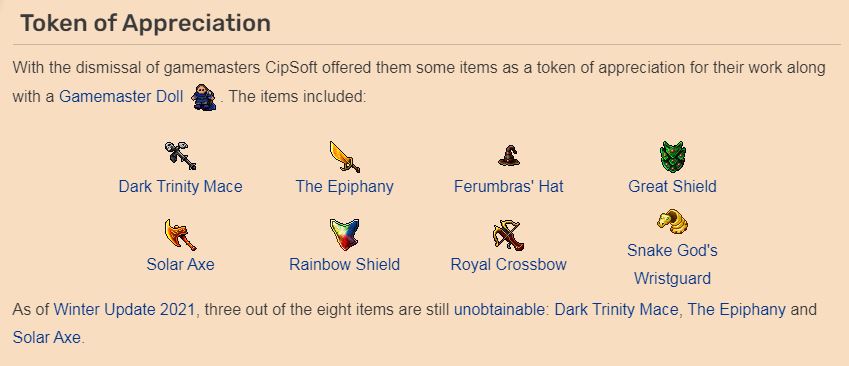
Many players over the years had disliked the GMs and called them corrupt but in the years that followed, the number of people I heard lament their loss makes me believe that their impact on the game was something we should have been grateful for. The one constant lesson I have learned in all my time playing is that Tibian players are some of the most unsatisfiable people on earth.